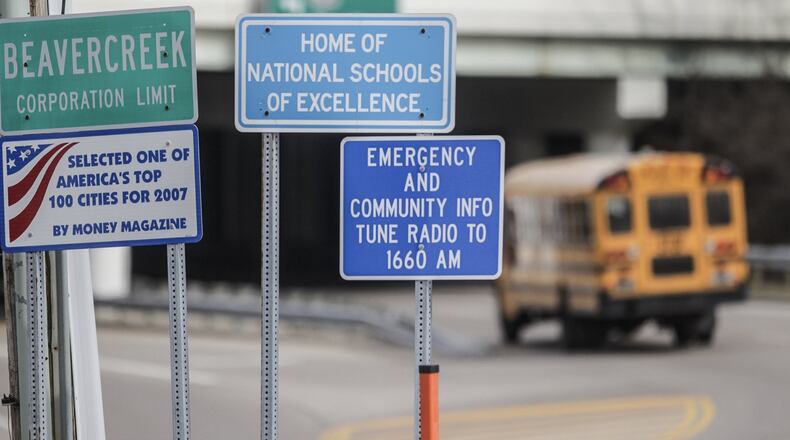A first ordinance reading on the proposal could happen as early as the March 23 regular meeting.
A group of about eight residents has organized with Jarvis and former mayor Carol Graff to form the Beavercreek Fairer Funding Committee in an effort to see the issue make it to a November vote.
If passed by voters, the new earned income tax would not begin until Jan. 1, 2022. A 3.4 mill property tax levy scheduled to expire at the end of 2021 would be allowed to expire rather than be put up for renewal. The proposal says none of the street, police, parks and infrastructure bond levies planned for 2021-2023 would be put on the ballot if an earned income tax was put in place.
National super PAC money shows up in Greene County prosecutors race
The group said the tax would reduce residents’ property taxes and reduce the city’s reliance on property taxes, ensure non-residents pay their fair share for local public services and it would help seniors stay in their homes with the retired, or fixed income, and active duty military being income tax-exempt.
Opposition groups like the Beavercreek Tax Busters have continuously fought the issue whenever a push for an income tax resurfaces.
John Mitchel, Tax Busters member and 30-year Beavercreek resident, said the group will again oppose the tax if it goes on the ballot.
Dayton hospital closing due to profitability problems
“We know that there are issues in the city right now — financial issues that a lot of the residents are concerned about right now,” Jarvis said. “I didn’t totally disagree with them back then (in 2013). … This really helped us this time because we knew what the issues were and we made sure this proposal fixes those issues.”
This is not the first time the city has attempted to add an earned income tax.
In 2013, voters turned down a 1.5% earned income tax because opponents said the tax did not have enough accountability about how the money would be spent for capital improvements.
In 1984, four years after the city was incorporated, voters defeated a 1.5% income tax by a nearly 4 to 1 margin. Ten years later, voters said “no” to a 1% income tax by a similar margin.
Jarvi said the tax would avoid more than 5.5 mills of property tax increases every three to five years.
Greene County voters face choices for commission, prosecutor, more
Beavercreek has reported it has about $200 million worth of backlogged work on infrastructure upgrades and capital projects. The group said with the city’s current property tax levies, the work will take nearly a century to complete, but with their proposal, it could get done in 20 to 40 years.
“What we found in our committee was, when we crunched all the numbers for our income tax, it would be less expensive to our community than going with the city’s current plan with the property tax increases,” Jarvis said.
Not all residents want to see the city added to the majority group of Ohio cities that have an earned income tax.
“When you have a city income tax, you don’t really know where it’s going,” Mitchell said. “It goes into the treasury and I think they kind of say ‘Oh we’re going to target infrastructure.’ Well, yeah — but they don’t say which infrastructure.”
(2013) Beavercreek tax levy fails
Mitchel has run for multiple local and state positions including a campaign against Mike Turner for state representative in 2018.
“I’m done with that. I’m 72 years old. I’m going to do other things to display my activism — Tax Busters is one of those.”
While Mitchel is staunch on his opposition to the tax, other retired residents feel the tax is necessary.
“I’ve lived in Beavercreek over 40 years and during that time, Beavercreeek has changed,” said Beavercreek resident and retiree, Rosalind Brailey. (It) has grown from a bedroom community … now, we have businesses everywhere and 75% of those working in Beavercreek live in the surrounding areas.”
Yellow Springs again to decide if teens, non-U.S. citizens should vote
According a city report, 23.8% of Beavercreek jobs are held by Beavercreek residents.
Brailey’s concerns almost echoed what the then Beavercreek Vice Mayor Jerry Petrak said in 2013.
“The first two income taxes, I was an anti,” Petrak said. “At that time, we were literally a bedroom community. … Now we are no longer a bedroom community. We are a destination community. It has changed completely.”
“This was not an easy solution. and the city won’t be able to maintain its aging infrastructure, provide quality of life that the residents want, and address their concerns without some other solution,” Jarvis said. “As you can see, this is a very difficult uphill push to satisfy all these desires of the residents and the city. But we believe that we have a solution here.”
Local earned income tax rates
(ranked by largest populations)
1. Dayton 2.5%
2. Hamilton 2%
3. Springfield 2.4%
4. Kettering 2.25%
5. Middletown 1.75%
6. Beavercreek 0%
7. Fairfield 1.5%
8. Huber Heights 2.25%
9. Fairborn 1.5%
10. Mason 1.12%
11. Xenia 2.25%
Source: City of Beavercreek
About the Author
